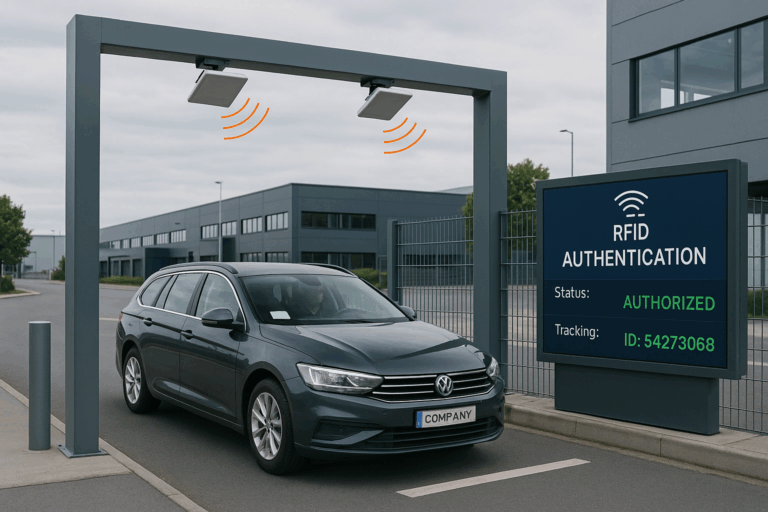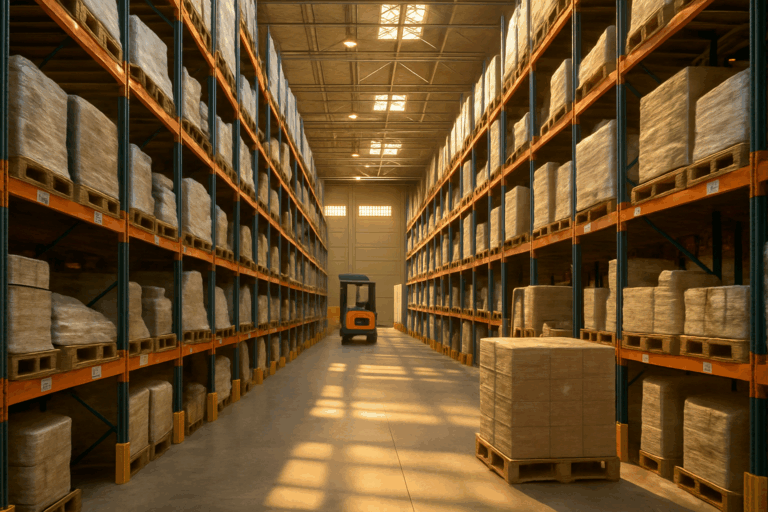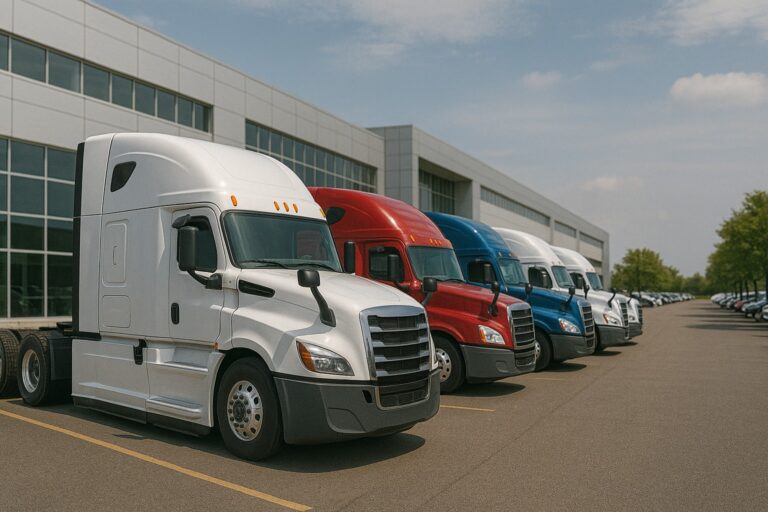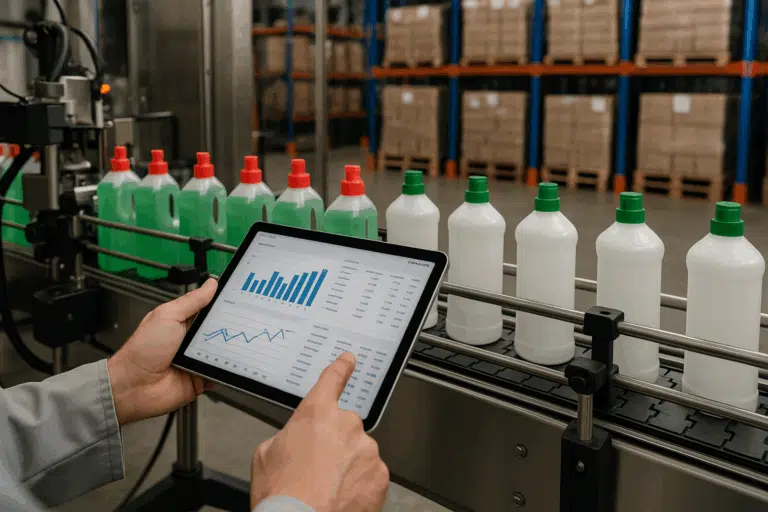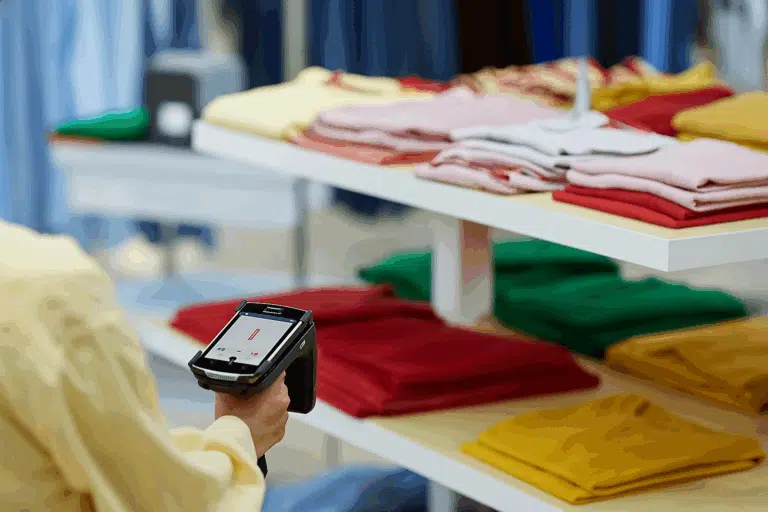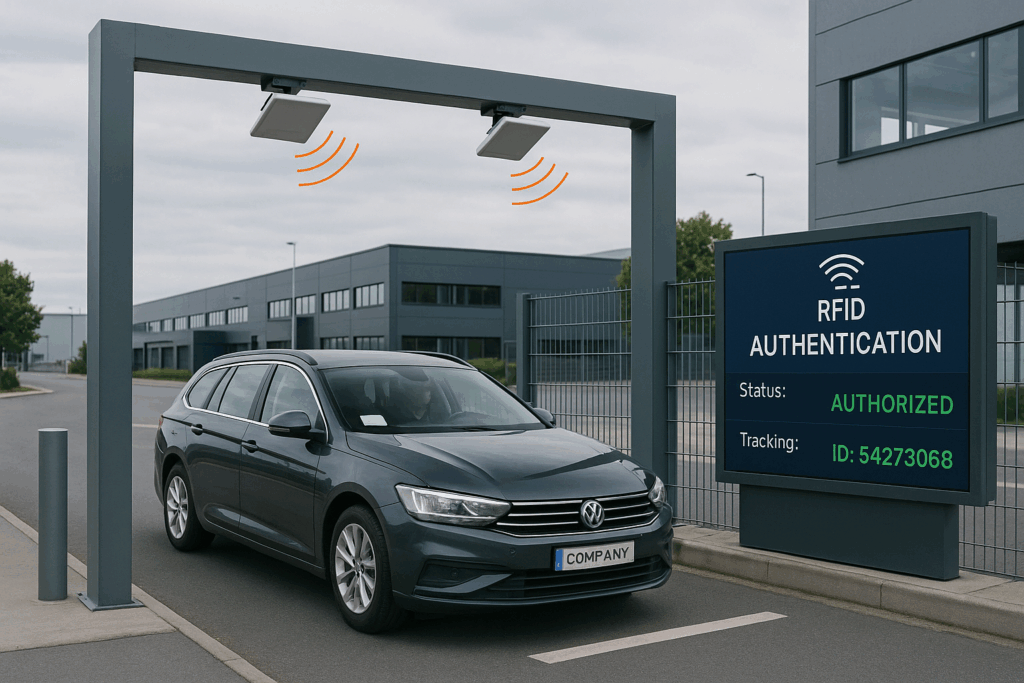At The CPCON Group, we’ve seen how smart manufacturing with RFID changes things. RFID technology applications on the shopfloor change how businesses track and manage things. They get real-time visibility and accuracy, making them stand out in the competitive market.
We’ve been working in fixed asset management for over 25 years. We use new strategies like Maintenance, Repair, and Operations (MRO). This helps us improve how industries use technology to make more money. It starts with adding advanced shopfloor tracking systems to their work.
Table of Contents
ToggleKey Takeaways
- RFID systems improve inventory management and reduce labor.
- Real-time tracking and identification bolster operational efficiency.
- RFID significantly outperforms traditional barcode scanning.
- Smart RFID implementations are key to keeping pace in today’s market.
- Our expertise helps to customize RFID solutions for diverse manufacturing needs.
Contact one of our experts today to see how RFID architecture in a shopfloor can make your business more efficient and productive. Join the smart manufacturing with RFID era.
An Introduction to RFID in Factory Environments

At The CPCON Group, we see how RFID technology changes factories. It makes shopfloor tracking systems and inventory management with RFID better. This tech is key for our solutions.
RFID helps track items in real-time across the factory. It also makes rfid architecture in a shopfloor better. This means no more stock-outs or overstocking, keeping inventory lean.
With RFID, factories collect data automatically. This cuts downtime and boosts output. It’s key for staying efficient.
RFID systems are crucial for tasks like maintenance and quality checks. They track items automatically, even in complex places. This is very useful.
- Real-time visibility of assets improves decision-making.
- Electronic tagging reduces manual errors and workforce requirements.
- Durable RFID tags ensure long-term usability and cost savings.
Big names like Wal-Mart and the U.S. Department of Defense use RFID too. They show RFID’s power in managing inventory and tracking operations.
RFID systems are advanced. They work at different frequencies and with many tag types. This makes them versatile and strong.
We have over 25 years of RFID experience. We design systems that fit your operations well. This means less disruption and more benefits.
RFID can make your factory work better. It can boost your productivity and efficiency. Contact our experts to see how RFID can help your shopfloor.
Exploring RFID Technology Applications in Manufacturing

In today’s fast-changing world, rfid integration in factory settings is key. At The CPCON Group, we focus on custom RFID solutions to unlock the power of this new tech.
The Role of Passive and Active Tags
Knowing the difference between active and passive RFID tags is key in manufacturing. Active tags have their own power and are great for tracking over long distances. Passive tags don’t need their own power and are cheaper, perfect for tracking inventory over short distances.
Using these tags makes work on the shop floor smoother. It makes rfid solutions for shopfloor work better.
Enhancements to RFID Readers and Antennas
RFID readers and antennas have gotten better, meeting the needs of RFID tags. They can now pick up signals better and work over longer distances. This helps both passive and active tags work better in big factories.
Integrating RFID with Warehouse Management Systems
Putting RFID with warehouse systems changes the game in manufacturing. It makes managing inventory and assets automatic and accurate. This leads to better work flow and smarter decisions.
| Aspect | Traditional System | RFID-Integrated System |
|---|---|---|
| Shipment Time Reduction | None | 60% |
| Material Waiting Time Reduction | Minimal | 93.3% |
| Record Accuracy Improvement | Low | 66.67% |
| Overall Efficiency | Variable | Significantly Higher |
RFID’s impact on manufacturing is real and measurable. It has led to big improvements in performance where it’s used.
At The CPCON Group, we see the big change RFID brings to manufacturing. By using rfid architecture in a shopfloor, companies can see new levels of transparency and efficiency. We invite you to talk to one of our experts to see how RFID can change your operations.
The Different Types of RFID Tags and Their Uses

In the world of smart manufacturing with RFID, picking the right RFID tag is key. These tags are vital for RFID use on the shopfloor. They vary in power source and how they communicate, fitting different needs and places.
Choosing Between Passive, Active, and Semi-Passive RFID Tags
When picking an RFID system, we look at passive, active, and semi-passive tags. Passive tags get power from the reader and are great for tracking close by. They’re often used for inventory because they’re cheap and small.
Active tags have their own power and work well in big areas for tracking far away. They’re good for tracking valuable items over large spaces. Semi-passive tags use a battery but talk to readers, perfect for places needing a bit of range.
Customizing RFID Tags for Various Manufacturing Needs
Custom RFID tags meet the unique needs of different manufacturing settings. They can be made tougher for tough conditions or add sensors for monitoring. This makes RFID systems more efficient and reliable.
In the car industry, strong active tags track parts during assembly. This helps speed up production and reduce delays. In the drug world, passive tags help manage inventory accurately. This keeps things in check and avoids stock issues.
Choosing RFID tags for specific tasks and places lets manufacturers use RFID tech fully. This boosts efficiency and can save money. At The CPCON Group, we suggest carefully looking at your needs to pick the best RFID tags.
Want to see how RFID can change your shopfloor? Talk to one of our experts today. We can show you how our RFID solutions can improve your operations.
Key Components of RFID Systems in Smart Manufacturing
At The CPCON Group, we see how RFID solutions for shopfloor change smart manufacturing. The key parts of an RFID system are crucial for better work. They make things run smoother and smarter.
RFID tags are key in RFID architecture in a shopfloor. They hold important data that can be read and updated on the move. This helps track items and boosts efficiency with RFID by giving real-time data.
RFID readers send information from tags to the digital world. With advanced readers, data capture is quick and accurate. This helps make shopfloor work better by cutting down on mistakes and checking processes.
The RFID middleware is also vital. It takes raw data from tags and readers and turns it into useful information. This info helps with tracking and makes operations more efficient.
- Data Accuracy: Modern RFID systems make data more reliable, cutting down on mistakes in production and logistics.
- System Integration: Working well with ERP/EDI systems makes data sharing smoother.
- Real-time Monitoring: RFID gives real-time data, helping make quick decisions in manufacturing.
RFID systems are becoming a must-have in modern manufacturing. They give businesses total control and insight into their processes. This helps not just in tracking and managing work but also in making the manufacturing world stronger.
At The CPCON Group, we always work to improve our RFID solutions. We focus on innovation and efficiency. We invite you to see how our RFID expertise can make your manufacturing better. Contact our experts today to learn how improving efficiency with RFID can change your operations.
RFID Implementation Strategies in Shopfloors

At The CPCON Group, we know that making RFID work in shopfloors takes careful planning and smart moves. We start with a detailed plan and check if RFID fits with what you’re already doing. This makes sure RFID works well with your current operations.
Initial Planning and Feasibility Analysis
We look closely at what your shopfloor needs to see how RFID can make things better. This means figuring out the best RFID setup for your space and tech needs. We also look at the possible benefits to make sure RFID is a good fit for you.
Phased Approach vs. Full-Scale Rollout
Choosing between a step-by-step or full rollout is a big decision. Going step-by-step lets us check and tweak as we add RFID in parts of the shopfloor. A full rollout is quicker but needs a lot of prep to avoid problems.
Each method has its own pros and cons, based on your operation’s size, budget, and how fast you want to change. Using RFID well means picking a strategy that matches your business’s size and goals.
| Journal/Publication | Percentage | Field Relevance |
|---|---|---|
| Journal of Intelligent Manufacturing | 11.84% | RFID in Manufacturing |
| Robotics and Computer-Integrated Manufacturing | 6.58% | Automation and RFID Integration |
| International Journal of Advanced Manufacturing Technology | 5.26% | Advanced RFID Technologies |
We use data and the latest RFID tech to make your move to smarter manufacturing easy and beneficial. For a detailed look at how RFID can change your shop floor, get in touch with one of our experts today.
Benefits of RFID Integration in Inventory Management

At The CPCON Group, we’ve seen how RFID changes the game for shopfloor activities. RFID systems make inventory management better and more accurate. They save time and help businesses grow.
Studies show RFID is a game-changer for managing inventory. Retailers using RFID can see a 5% increase in sales. It also cuts labor hours by 10% to 15%, showing it’s a smart investment.
Here’s why RFID is key for today’s inventory:
- Efficiency in Stock Management: RFID tracks inventory in real-time. This keeps stock levels up to date and accurate. It helps avoid overstocking and running out of items, making the supply chain better.
- Labor Cost Reduction: RFID automates inventory checks, cutting down on manual work. This lowers the costs linked to these tasks.
- Improved Customer Satisfaction: With accurate inventory info, businesses can fill customer orders better. This makes customers happier.
Let’s look at how RFID changes things on the shopfloor:
| Parameter | Impact |
|---|---|
| Inventory Accuracy | Increases, reducing revenue loss due to stock discrepancies |
| Labor Costs | Reduction in manual labor through automation |
| Customer Satisfaction | Improvement due to accurate and prompt service availability |
| Risk Mitigation | Decreased due to increased traceability and loss prevention |
Walmart’s move to require RFID tags on products shows how vital RFID is. It helps stay competitive and meet today’s retail demands.
In summary, RFID in inventory management brings big benefits. It makes the supply chain more visible, cuts waste, and boosts efficiency. For more info on how RFID can change your inventory management, reach out to our RFID experts at The CPCON Group.
RFID Architecture in a Shopfloor: Navigating the Technological Elements
When thinking about RFID in a shopfloor, it’s key to look at how it can grow and work with other tech. We lead in RFID in factories, focusing on systems that fit today and tomorrow’s needs. This way, businesses can grow without big changes, saving time and money.
Constructing a Scalable RFID Network
A scalable RFID network is key for factories. It lets you add more RFID features as you grow, without a full system change. This saves time and money. It also means you can easily meet new production needs and market changes, keeping things running smoothly.
Ensuring Compatibility with Existing Infrastructure
It’s important for new RFID systems to work well with what you already have. This makes adding RFID smoother and uses your current tech better. A smooth start means less downtime, more work done, and a faster payback on your investment.
At The CPCON Group, we mix strategy and practicality in RFID systems. This makes them easy to use and fit into your current setup. Here are some stats that show how RFID is making a big difference in factories:
| Statistic | Impact on Manufacturing |
|---|---|
| RFID increases sustainability | Reduces carbon footprint by optimizing resource utilization |
| Passive vs. Active Tags | Enhanced tracking capabilities with active tags, suitable for broader applications |
| Future of RFID | Expands into IoT and cloud computing for enhanced real-time decision-making |
| RFID in smart manufacturing | Improves real-time information visibility, enhancing timely decision-making and productivity |
Using RFID tech makes your operations better and gets you ready for new tech. If you want to boost your manufacturing with RFID, contact one of our experts at The CPCON Group. We can talk about how RFID can change your production with you.
Real-time Shopfloor Tracking Systems Powered by RFID
At The CPCON Group, we see how RFID technology applications change manufacturing. Real-time shopfloor tracking systems use RFID to make production smoother and more efficient.
These systems are key for keeping track of work in progress with great accuracy. They give a clear view of every step in making products. RFID tags cut down on manual work, reducing mistakes and making things faster.
Monitoring Work-in-Progress with Precision
RFID technology in our systems gives live updates on each part’s status. This lets us make quick changes and better decisions. It makes the production flow smoother.
Automating Data Capture for Enhanced Productivity
RFID tags make tracking automatic, letting us keep an eye on things like how much labor is used, materials, and machine time. With RFID badges and sensors, we get accurate, up-to-date info. This helps control costs and manage assets better.
Our solutions work well in many industries. For example, The Jolanka Group cut end-line defect rates by 25% with our Res.Q MES and RFID. These systems can use RFID, barcode, or QR codes, so they fit different needs.
Adding RFID boosts productivity and makes data more reliable. It gives a full view of what’s happening on the shopfloor. Our clients use real-time dashboards to make reports and analytics. This helps them improve their businesses a lot.
For those wanting to use rfid architecture in a shopfloor to its fullest, we’re here to help. Our RFID solutions at The CPCON Group make sure your system can grow with the changing needs of manufacturing.
Get in touch with one of our experts today. Learn how our RFID solutions can make your shopfloor operations more efficient and precise.
Improving Shopfloor Efficiency with RFID Solutions
For over 25 years, The CPCON Group has worked on making shopfloors better with RFID. RFID is key in managing assets and workflows well. It helps improve how we handle materials and keep track of inventory.
Studies show RFID cuts costs and errors in making ICs. Using RFID with other systems makes things easier for workers and cheaper. This makes the process smoother and cuts down on mistakes, making customers happier.
- Reduction of labor costs and man-made errors via RFID applications.
- Enhanced electronic information management reduces operational losses.
- Focused improvements in the assembly processes for specific IC products through detailed RFID tracking.
- Demonstrated capability to rewrite data on RFID tags over 100,000 times, ensuring the longevity and reusability of the tags.
We found RFID helps in certain parts of making ICs. For example, using RFID when receiving wafers and entering data into the ERP system makes things run smoother.
| Aspect | Improvement with RFID |
|---|---|
| Material Flow Control | Integration with ERP and RosettaNet reduces workload |
| Data Accuracy | Automation ensures fewer errors and real-time tracking |
| Operational Cost | Significant cost reductions evident in IC assembly evaluations |
| Client Satisfaction | Reduction in complaints and penalties due to enhanced process control |

RFID technology helps us meet today’s needs and get ready for the future. It’s not just a new tool; it’s a way to make our business better for the long run.
Contact one of our experts today to see how RFID can change your shopfloor for the better. It can bring you more productivity and a strong edge in the market.
Best Practices for RFID Implementation on the Shopfloor
Putting RFID technology on the shopfloor needs a smart plan. It’s key to know the rfid solutions for shopfloor and follow best practices for rfid implementation. At The CPCON Group, we stress the need for good training and keeping the system up to date. This makes sure our RFID systems work well, are safe, and reliable. We’ll share how we blend strong rfid architecture in a shopfloor.
Training Staff for RFID System Adoption
Getting RFID solutions to work well means training staff well. We’ve found that training helps reduce mistakes and makes things run smoother. Our training covers basic scanning to managing data, fitting the needs of each shopfloor.
Maintaining RFID System Health and Security
Keeping the RFID system running well is key to its success. We do regular checks and updates to stop problems before they start. Our plan includes software updates, checking hardware, and looking for security risks. This keeps the RFID system safe and working well, helping with productivity and security.
Using these best practices, The CPCON Group makes the most of RFID technology. This leads to better accuracy and more productivity in our clients’ production lines. We invite you to talk to one of our experts to see how RFID can change your manufacturing for the better.
Overcoming Challenges in RFID Shopfloor Integration
Adding RFID tech to factories has its own set of challenges. At The CPCON Group, we tackle these issues head-on. We aim to make rfid integration in factory settings work well and boost productivity.
Choosing the right RFID tags and readers is key. They must handle the tough conditions of a factory and give accurate data. We also work on making processes better to fit RFID into what’s already there.
Data security is a big deal with RFID systems. We use top-notch encryption and privacy rules to keep data safe. It’s also vital to train everyone to keep data secure and build trust among workers.
- Technical adaptation
- Component selection
- Data privacy assurance
- Workflow integration
| Challenge | Strategy | Impact |
|---|---|---|
| Technical Issues | Custom RFID solutions | Enhanced tracking, reduced inefficiencies |
| Change Management | Comprehensive training programs | Improved adaptation and morale |
| Data Security | Encryption and strict protocols | Secure data flow, increased trust |
| Integration Complexity | Workflow modification | Seamless system functionality |
Integrating RFID tech into a shopfloor is complex. But with our expert team, advanced tech, and focus on customers, we can overcome these hurdles. We’re ready to improve your factory operations with rfid integration in factory settings.
If you want to boost your factory with RFID, don’t wait. Contact one of our RFID experts today. Let’s talk about how we can customize our solutions for you!
The Present and Future of RFID-Enabled Smart Manufacturing
We at The CPCON Group are leading the way in RFID solutions for the shopfloor. We aim to boost efficiency and shape the future of manufacturing. RFID technology is changing how we make things, especially in the semiconductor industry.

Trends Shaping Industrial RFID Use
The semiconductor back-end industry is a great example of RFID’s impact. It has tight deadlines and complex steps like die bond, wire bond, and molding. RFID architecture in a shopfloor helps reduce delays, making production smoother and more predictable.
Emergent Technologies Complementing RFID Systems
Adding new tech like the Industrial Internet of Things (IIoT), Artificial Intelligence (AI), and big data analytics to RFID is changing manufacturing. This mix helps with scheduling and monitoring in real-time. It’s crucial for industries like semiconductor making, where orders often change.
| Process Stage | Bottleneck Potential | RFID Impact |
|---|---|---|
| Die Bond (DB) | High | Reduced lead-time variances |
| Wire Bond (WB) | Medium | Enhanced scheduling accuracy |
| Molding | High | Optimized machine use |
RFID is making manufacturing smarter and more precise, especially in the semiconductor industry. At The CPCON Group, we’re dedicated to improving operations with the latest RFID technology. Reach out to our experts to see how RFID can upgrade your manufacturing and keep you ahead in the tech race.
Cutting-edge RFID Solutions for Modern Shopfloors
The CPCON Group is an expert in RFID solutions for shopfloors. We make operations more efficient in many industries. Our RFID tech helps with real-time inventory updates, key for fast-moving manufacturing.
We focus on RFID architecture in a shopfloor. Our solutions lead the way in managing assets and tracking them. They help set new standards for efficiency.
The CPCON Group’s Expertise in RFID Innovations
We’ve been working with RFID for over 20 years. Our IoT-enabled RFID systems bring new levels of transparency and ease to industries. They help with managing data in smart job shops.
Our solutions cut equipment breakdowns by up to 70%. Companies using our RFID have seen big cost cuts, like a 40% drop in energy costs for machines.
Why Choose the CPCON Group for Your RFID Needs
Choosing us means getting reliable and cutting-edge RFID management for complex shopfloors. We make sure inventory data is accurate and improve how fast stock moves. This reduces the risk of running out of stock.
Our real-time tracking leads to better automation and precise process monitoring. This has cut manufacturing errors by over 65%. With companies like Artesis, we’ve seen a 20% drop in maintenance costs and a 10% increase in production efficiency.
The CPCON Group also focuses on training and managing job histories. This ensures your shopfloor has the latest tech and skilled people. Our RFID solutions are made to meet your business needs, promoting ongoing improvement and innovation.
If you want to boost your shopfloor’s efficiency with top-notch RFID solutions, contact one of our RFID experts today. Let The CPCON Group lead your RFID strategy into the future.
Conclusion
We’ve shown you how RFID technology changes the game on the shop floor. It makes tracking things in real-time and boosts efficiency. We talked about 25 ways RFID helps with Shop Floor Control, divided into four main areas.
RFID is key for managing the whole Supply Chain, not just making things. A company cut their time to ship by 60%, wait time by 93.3%, and record time by 66.67%. This shows how RFID changes things for the better.
RFID also helps create a lot of Big Data in industries. This data helps make smarter decisions and improve how things are made.
We have over 25 years of experience with RFID and managing assets. We can help you find the right RFID solution for your needs. If you want to learn more, contact RFID experts at The CPCON Group. Let us help you use RFID technology to improve your operations.
FAQ
What are the core benefits of integrating RFID technology on a shopfloor?
RFID technology makes tracking items in real-time easier. It helps manage inventory better and cuts down on mistakes. It also makes making things faster and more efficient.
RFID automates data capture, which makes work flow better. It reduces the need for manual work. And it gives a clear view of how things are made.
How do RFID systems contribute to smart manufacturing?
RFID systems are key to smart manufacturing. They let data move in real-time. They automate tracking inventory and assets. And they help make quick decisions with accurate info.
This leads to better production, less downtime, and a quicker response in making things. It makes manufacturing smarter.
What are the differences between passive, active, and semi-passive RFID tags?
Passive RFID tags don’t have their own power and work when a reader signals them. They’re a budget-friendly choice for tracking close by. Active RFID tags have their own power, so they can track items over a longer distance.
Semi-passive tags use a tiny battery to power their circuitry. They offer a mix of range and cost. They’re a hybrid option.
Can RFID systems be integrated with existing warehouse management systems?
Yes, RFID can work with warehouse management systems. This makes tracking more accurate and gives a clear view of inventory in real-time. It automates tracking, making supply chains and operations better.
What should be considered when implementing RFID on a shopfloor?
When adding RFID to a shopfloor, first check if it’s a good fit for your business. Decide if you’ll start small or go big based on your resources. Make sure your team knows how to use it.
Also, keep the system updated and secure for the best performance.
How does RFID improve inventory management in factory settings?
RFID keeps track of inventory in real-time. It automates counting and checking to cut down on mistakes. It gives insights for better supply chain decisions.
This helps avoid stock issues and reduces waste and overstocking.
What are the best practices for RFID system health and security on the shopfloor?
For RFID systems, train your staff well for a smooth start. Keep the system updated and in good shape. Make sure the hardware works well.
Also, protect your data from breaches with strong security measures.
What are some upcoming trends in RFID-enabled smart manufacturing?
Future trends include RFID working with IoT, AI, and big data analytics. This will make manufacturing systems more connected and smart. We’ll see better RFID tags and a focus on keeping data safe.
Why should a company choose the CPCON Group for RFID solutions?
Choose The CPCON Group for RFID because we have lots of experience. We tailor RFID solutions to fit your needs. Our goal is to make your shopfloor more efficient.
We make sure our solutions match your inventory and asset management goals.
Source Links
- On-Line Synchronization of Shop Floor Documentation Using RFID Technology – https://link.springer.com/chapter/10.1007/978-3-642-16402-6_28
- PDF – https://link.springer.com/content/pdf/10.1007/s10845-010-0476-2.pdf
- Microsoft Word – 0bc80e95832Smart Shop Floornew – https://www.rfidjournal.com/wp-content/uploads/2019/07/272.pdf
- Reordering the “World of Things”: The Sociotechnical Imaginary of RFID Tagging and New Geographies of Responsibility – https://www.ncbi.nlm.nih.gov/pmc/articles/PMC6805960/
- How RFID Asset Tags Evolve the Production Floor – https://redbeam.com/blog/how-rfid-tags-transform-the-production-floor/
- Microsoft Word – The 2013 International Conference of Computer Science and Engineering0218 – https://www.iaeng.org/publication/WCE2013/WCE2013_pp941-943.pdf
- RFID Application in a Multi-Agent Cyber Physical Manufacturing System – https://www.mdpi.com/2504-4494/4/4/103
- RFID in Manufacturing: The Ultimate Guide | ASC – https://ascsoftware.com/blog/rfid-in-manufacturing-the-ultimate-guide/
- RFID Middleware Design and Architecture – https://www.intechopen.com/chapters/18099
- The application of intelligent RFID system in industrial control (rfid-life.com) – https://www.linkedin.com/pulse/application-intelligent-rfid-system-industrial-control-rfid-lifecom-0u0ec?trk=public_post_main-feed-card_feed-article-content
- RFID Solution with Smart Forklifts in Automobile Production – https://www.turck.us/en/rfid-solution-with-smart-forklifts-in-automobile-production-44872.php
- A case of implementing RFID-based real-time shop-floor material management for household electrical appliance manufacturers – https://colab.ws/articles/10.1007/s10845-010-0476-2
- PDF – https://arxiv.org/pdf/1805.07715
- PDF – http://portalabepro.educacao.ws/ijcieom/restrito/arquivos/icieom2022/FULL_0015_37573.pdf
- What is RFID Technology and How Does It Work? A Guide for Retail (2024) – Shopify – https://www.shopify.com/retail/rfid-technology
- RFID and Supply Chain Management for Manufacturing Digital Enterprise – https://www.intechopen.com/chapters/18524
- Intelligent and integrated RFID (II-RFID) system for improving traceability in manufacturing – Advances in Manufacturing – https://link.springer.com/article/10.1007/s40436-014-0053-6
- Future of RFID: Increased sustainability by bridging the gap between RFID and other technologies – Nordic ID – https://www.nordicid.com/resources/blog/future-of-rfid/
- Microsoft Word – 2E49BAFA.doc – https://www.rfidjournal.com/wp-content/uploads/2019/07/202.pdf
- Shop floor data collection systems 101 – https://www.plantservices.com/asset-management/software/article/11288995/shop-floor-data-collection-systems-101
- Shop Floor Production Tracking – Res.Q – Coats Digital – https://www.coatsdigital.com/en/manufacturer/resq/
- CNC Machine Monitoring Software | Data Collection Software | OEE Software | Real Time Data Collection Software | Predator MDC software – https://www.predator-software.com/predator_mdc_software.htm
- Abstract – https://citeseerx.ist.psu.edu/document?repid=rep1&type=pdf&doi=6bce477ad11e5181328ade2e3d7527288f97e4e0
- PDF – https://www.rfidjournal.com/wp-content/uploads/2019/07/220.pdf
- Design Guidelines for RFID-Based Applications in Manufacturing – https://scholar.archive.org/work/fd7m3cdvvrbszdqxdmbksonqhy/access/wayback/https://aisel.aisnet.org/cgi/viewcontent.cgi?referer=&httpsredir=1&article=1095&context=ecis2008
- PDF – https://www.nowpublishers.com/article/DownloadSummary/TOM-020
- Deployment of RFID sensors in supply chain management – a review – https://www.extrica.com/article/22565
- A real-time production scheduling method for RFID-enabled semiconductor back-end shopfloor environment in industry 4.0 – https://www.emerald.com/insight/content/doi/10.1108/IJSBI-05-2023-0027/full/html
- PDF – https://pdfs.semanticscholar.org/52a3/bfff964380b293236737425af3cf8d8eeb64.pdf
- IoT in Manufacturing: Applications and Benefits of Smart Factories – https://www.digi.com/blog/post/iot-in-manufacturing
- 13 59212 RFID and industry 4.0 the technology’s role on shop floor control operationalisation – https://revistas.pucsp.br/index.php/risus/article/download/59212/41468/189872





